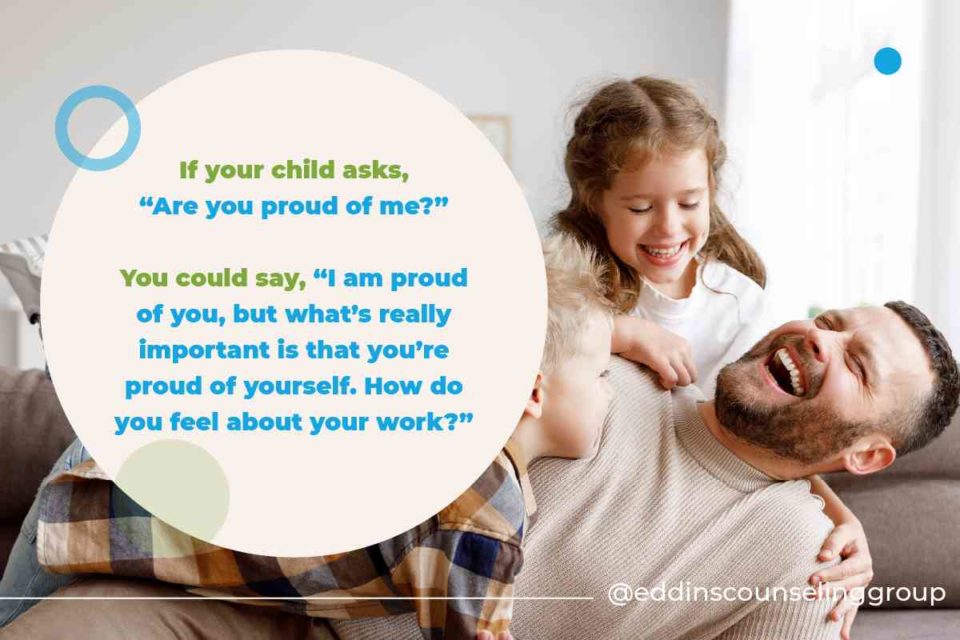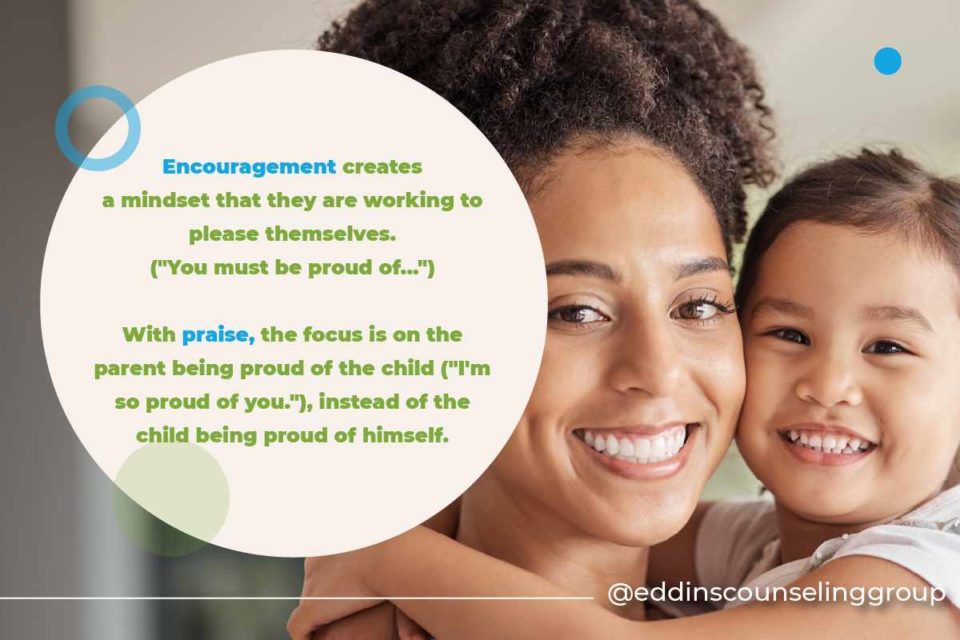January 23, 2023
Communication Strategies to Build a Child’s Self-Esteem
Written by Sara Lane
Posted in Parenting & Family and with tags: Communication, children, family
 When communicating with your child, practice using phrases of encouragement vs praise.
When communicating with your child, practice using phrases of encouragement vs praise.
Encouragement creates a mindset that they are working to please themselves. It establishes the framework where they don’t need you to feel good about themselves.
They know they’ve done a good job. They’ve put forth a good effort. And that’s why they can take pride directly in their own accomplishments.
Encouragement vs. Praise and Phrases to Avoid
Here are some examples of ways you can encourage your child to believe in themselves and admire their accomplishments — and phrases to avoid:
1) Avoid Saying “I’m So Proud of You”
“I’m so proud of you” is a statement of praise because the focus is on the parent being proud of the child, instead of the child being proud of himself.
It’s okay to be proud of your child and let him know it; but it’s more important that he develops an internal locus of control, which means he is motivated from within. We don’t want the child to do behaviors to please us – instead, we want him to work hard and do well because he feels proud of himself.
Kids raised on praise will come to depend on it. If your child asks, “Are you proud of me?” – you can respond by saying, “I am proud of you, but what’s really important is that you’re proud of yourself. How do you feel about your work?”
We foster an internal locus of control when we say, “You must be proud of…”
When we encourage the behavior – the deed – it helps kids feel capable and significant and they are more likely to repeat that behavior in the future.
2) Avoid Saying “You’re the Best on the Team”
It’s so tempting to overpraise as parents. We want our kids to know how amazing and special they are.
But be sure to tell them the truth, and avoid statements that make their success dependent on other peoples’ accomplishments.
What if the child isn’t the “best on the team” next season? How will he or she feel about themselves?
Calling out the success you see in your child without overpromising or patronizing their talents is a tough line to walk. You want to shower your child with compliments, but you want to be honest and truthful in what you say.
Why?
Because when they fail, you want them to hold onto what they know to be true about themselves.
So when they get picked last for the team next season, they won’t be devastated by the blow. Instead, they can hold onto the reminder that their skills and teamwork are traits they can admire in themselves.
Children don’t need to be the best in order to be great.
To be more encouraging, focus on the qualities that contribute to her success:
- working hard at practice
- working on skills in the backyard
- great teamwork
Those are the skills that lead to success on the field and elsewhere in her life.
Additionally, you can call out the progress you see in their sports and accomplishments. Focus on the improvements they have made since earlier in the season or last year.
Even if they aren’t “the best” or the leading scorer on the team, they can still feel proud of their hard work and improvement.
With encouragement, we’re not focused on the end-product (winning, being the best); we’re focused on progress towards the goal.
Even the slightest bit of movement in the right direction can be encouraged. When we encourage effort and improvement, kids can feel proud of themselves, even if they never get to the goal.
Encouraging improvement will foster confidence to pursue challenging endeavors/activities in other areas of their lives.
Your kids will know they won’t be judged for reaching or not reaching the prize. They can feel proud of getting outside of their comfort zones, doing their best and working towards a goal.
Avoid Labels
It’s best to stay clear of labels – even positive labels. Being the smartest, most athletic, or prettiest puts a lot of pressure on kids to maintain those labels. Not to mention, it says nothing about the hard work, practice time, and perseverance required to achieve success.
Instead of focusing on his or her cuteness, be more encouraging by focusing on the unique qualities on the inside.

3) Avoid Saying “You’re so smart.”
Not only is “You’re so smart” not very specific, it also assigns a label. This statement provides no information for the future.
- What behaviors are you hoping the child will repeat?
- Are they naturally smart, if so in what?
- What did they do to earn or accomplish that smartness?
Even positive labels such as “smart,” place a tremendous amount of pressure on the child to always be “smart.”
Eventually, there will be subjects that don’t come as easily – and how will your child feel when she is struggling? Will she share that with you? Perhaps she will take easier classes in a certain subject instead of really challenging herself – all to preserve her “smart” label.
Be Cautious of Giving Out Praise… But Why?
In groundbreaking research, Carol Dweck, Ph.D. showed that kids who were given one line of empty praise about being “smart at this” were actually less likely to tackle more difficult challenges the next time around than kids who were told, “You must have worked really hard.”
Instead of labeling the child as “smart,” focus on the enjoyment of learning and the qualities that will help her get through the difficult subjects she may meet with in the future:
- “Your hard work is really paying off.”
- “You seem to really enjoy science.”
- “You are really improving.”
- “I see you working on your homework and you’re doing a great job!”
- “With all of that hard work, you’re going places!”
Good Boy / Good Girl
“Good boy” and “good girl” is also a label. Anytime we give kids a label, it puts pressure on them to always be that label.
Further, what happens if a few minutes later, he doesn’t meet your expectations? Is he now the “bad boy?” We are best served by focusing on the specific behavior we want to encourage or the specific behavior we want to correct.
To be more encouraging – focus on the behavior – the deed.
- “Thank you for setting the table – that really helped me!”
- “I noticed how patient you were with your brother.”
- “You worked really hard getting this room clean!”
Giving your child a healthy space to feel that sense of accomplishment in themselves goes a long way towards developing a healthy self-esteem down the road.
“What do you think about it?”
With this comment, we are not giving our opinion of the child’s work – we are asking the child what he thinks.
This helps encourage internal reflection, fostering the child’s internal locus of control and teaching him to be self-reliant for his self-image.
Try asking:
- “How do you feel about it?”
- “What aspects of your project do you like best?”
It’s natural for parents to feel pride when children perform well, but the focus should be on the child and the qualities that created that result – hard work, perseverance, attitude, etc.
To be more encouraging, you can try:
- “You must feel really proud of yourself!”
- “What do you think contributed to that outcome?” (this encourages self-reflection, focus on specific behaviors)
Finding a communication style that works for you and your child is a process, and we’re so proud of your dedication to making your child feel like a star.
Praise Amongst Siblings
Between siblings, when we point out to one child how the other one is doing something desirable, it’s possible that we may be making discouraging comparisons.
Instead of praising Susie, focus on the behavior you want to see from everyone:
At home: “When everyone is sitting on their chairs with napkins on their laps, then we’ll serve dinner.”
“That’s a tough one, but you’ll figure it out.”
In this statement, we are empathizing with the fact that it is a tough issue, but expressing our confidence that he has what it takes to figure it out. Very encouraging!
Praising only the grade is problematic because what if next semester she brings home a “C” in language arts yet worked really hard for that “C”? How will she feel about sharing that report card?
To be more encouraging, you can acknowledge the “A” but tie the good grade to the behaviors that made it happen, the improvement of, or the enjoyment of the subject:
- “That ‘A’ reflects a lot of hard work on your part.”
- “The time you are putting into your homework is really paying off.”
- “Your math grade improved from last semester – what did you do differently to make that happen?”
Making these encouragements will go a long way towards fostering a healthy sense of accomplishment in your children.
As your kids learn to take pride in their work and themselves, you may start seeing a more confident person emerge.
Gaining confidence internally for their talents, skills, and hard work is an important life lesson to develop over time. Keep being a great role model for your kids by practicing this self-affirming in yourself.
Call out the good that you see yourself doing – in front of your family.
And be sure to encourage the good you see in yourself. Remember, you’re amazing!

More Communication Strategies
To work one on one with a trained professional on effective parenting strategies or child therapy to build your kid’s confidence, reach out to Eddins Counseling Group today to start up a session.
Practice your communication skills and learn how you can improve your relationship with your kids.
Find a therapist today that fits your needs in our Houston Heights, Houston Montrose, or Sugar Land locations.



















